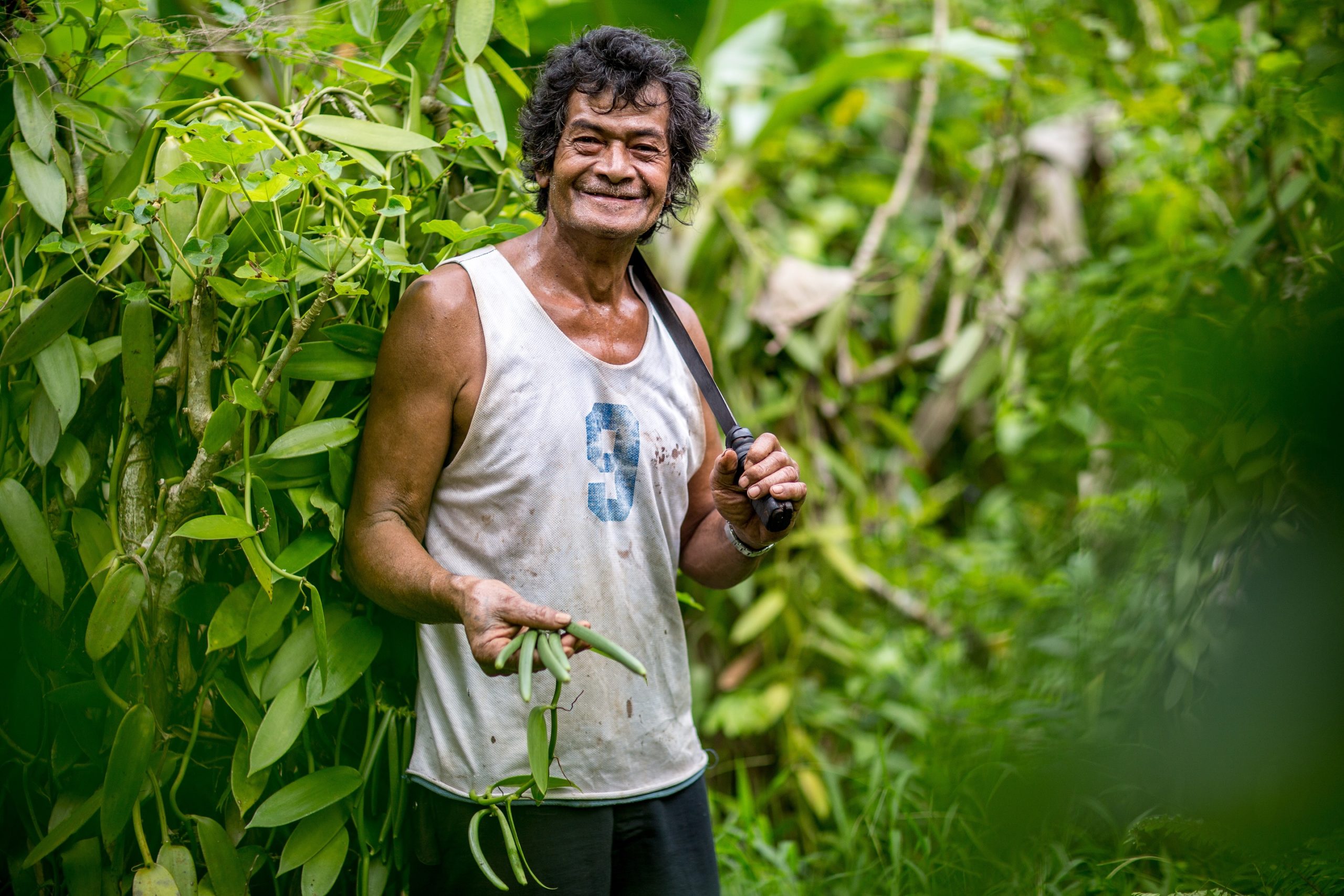Heilala Vanilla’s origins began in 2002 as an aid project founded by New Zealander, John Ross, and his family. We caught up with the good folks at Heilala to learn more about why they what they do.
SFB: What made you decide to go into vanilla farming?
Heilala: For a significant birthday, our founder John Ross (a retired New Zealand farmer) sailed to Vava’u, in the Kingdom of Tonga on a boat he’d built himself. He fell in love with the place and the people and when Cyclone Waka caused extensive damage to the Vava’u island group, he traveled back with friends from his Rotary Club to help with the clean-up. As a way to thank John for his efforts, a local family gifted him a plot of land in exchange for him using it to provide employment for those in the village. On a previous trip to Tonga, John had discovered vanilla orchids running wild and after some research and visits to established vanilla farms in Réunion Island, Tahiti, and Madagascar, he got to work on his own plot and subsequently partnered with other growers throughout Tonga to establish vanilla plantations
SFB: Your vanilla is different than the stuff that’s commercially available. Is it harder to do things your way? Why do you do it anyway?
Heilala: Home bakers and chefs today are demanding to know more about the ingredients they’re consuming, they want to know exactly what’s in their food, how it was sourced and produced. Heilala’s transparent supply chain, clean label ingredients and positive social impact to local grower communities along with support from customers inspire us to continue growing vanilla best practice.
SFB: Anything you wish people (chefs, consumers) realized about your product that they might not know?
Heilala: As one of the most labor-intensive crops in the world, there are lots of challenges growing vanilla! The orchid flower must be pollinated by hand and then the beans must be blanched, sweated, dried and cured. Climatic conditions play a major role as vanilla grows best in hot, humid conditions, and the plants require moderate rainfall evenly distributed through 10 months of the year, in order to thrive.
SFB: What do you wish people knew about the commercial/commodity/mass-market version of your product that they probably don’t?
Heilala: Typically vanilla is traded as a commodity similar to cocoa and coffee and can go through over ten sets of traders to reach the customer. which makes Heilala unique as a vanilla producer that grows, manufactures and markets the spice itself.
SFB: What are your hopes for the future of your field?
Heilala: In 2018, we completed 100 acres of vanilla planting in Tonga, which will enable us to continue to positively impact our grower communities in Tonga into the future. The growth will result in increased employment, particularly of local women in Tonga. As a result, there is an instilled sense of purpose and pride, which has a powerful effect on their independence, families, economic growth and the well-being of their communities. Heilala has a goal for 200 women to be employed in the Vanilla Industry in Tonga by 2022.
SFB: What is the most satisfying part of what you do?
Heilala: It’s always satisfying to see Heilala being used by a top bakery or restaurant and we were extremely excited when Flour bakery started using Heilala Vanilla. Each time a new customer comes on board a small group of villages in the South Pacific continues to be supported and have opportunities and options that they would not have had without the vanilla industry in Tonga. This is what gets us out of bed every day and is the most satisfying part!
Heilala Vanilla Comes Straight From The Source
Grown on rich, Pacific soil and dried under the Polynesian sun, the world’s best vanilla is an all-natural product of a perfect climate. With a highly-scientific, unrefined process (cold-pressed, slow-extract), and an artisan work culture of the hard-working local farmers and families, Heilala Vanilla is innovating outdated Vanilla products and production.
Many know orchids to be a delicate, fickle flower, but few realize that Vanilla is a genus of the very same plant and that beans take 3 to 5 years to grow. Our farmers are dedicated craftsmen, tending to each plant with in-depth wisdom and expertise.
What makes Heilala Vanilla different?
- The freshness and quality of Heilala Vanilla beans set them apart. Heilala Vanilla Beans are glossy, dark brown and supple—all indications of quality and freshness.
- Heilala Vanilla is traceability from their plantations straight to the consumer’s pantry ensuring that there is s no unnecessary handling.
- Heilala Vanilla partners with growers throughout Tonga to provide employment along with access to running water, housing, and facilities for education.

Words and photos courtesy of Heilala Vanilla